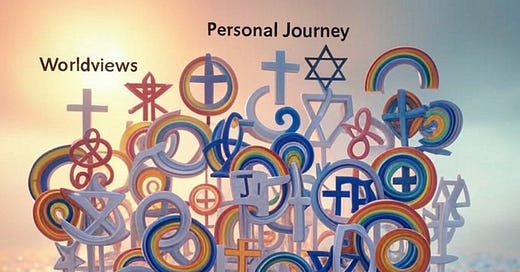You may not realise it, but in the fight against antisemitism and other inter-ethnic hatreds, nothing is more important than good quality Religious Education (RE). No, I am not exaggerating. Hatred thrives on a diet of ignorance. As I have argued elsewhere, Religious Education offers a far superior model for preventing hatred that is far more effective than what is often marketed as “diversity training.”
Unfortunately, the integrity of RE is under threat, and this relates to a movement to decolonise the curriculum and problematise the concept of religion. This may be just an annoyance to larger religious communities, or those religions that are privileged to be allocated significant time in the classroom. However, to Jews it actually poses a danger to our safety. For us, not being understood has real life physical consequences.
Today’s episode is a recording of a video seminar I gave last Sunday about my recent experience in Berkshire, where a highly inappropriate Pan Berkshire Religious Education Syllabus was pushed through in the autumn.
This included a shift in focus towards philosophy, viewing religious beliefs as propositions requiring evidence. The final draft also erased the word “Israel” (even the term “Children of Israel”). We (the Jewish and Hindu representatives who complained) were told that the problematic elements in this syllabus came from the new Religion and Worldviews framework, which, it is argued, is the new improved method of teaching RE.
Since we were told that this syllabus came from Worldviews, I researched the history and philosophical underpinnings of the Worldviews Framework. I learned that this new approach to RE is based on a post-modern deconstruction of religion. This critique claims that the concepts of religion and of the religions are colonialist concepts based on power. Instead, religions are now to be viewed as “religious worldviews”, in a framework that is meant to reflect the diversity of lived experience as well as being more inclusive of nonreligious approaches to life such as Humanism.
We are being told that the shift to Worldviews is necessary in order to free us of the “World Religions Paradigm”, a reductive framework that treated religions as self-contained, sometimes stagnant, belief systems. Of course this is false, as in recent years, RE teaching had made a very positive shift to the Believing/Behaving/Belonging (3B’s) framework, which acknowledged that beliefs are just part of the picture in any religion, and that religious traditions are complex and inter-connected. By comparison with 3B’s framework, Worldviews appears regressive, shifting the focus back to belief under the guise of “decolonising the curriculum.”
Treating religions as worldviews creates serious challenges for the teaching of Judaism, as Judaism is not a set of viewpoints or beliefs but is founded primarily on identity and practice. In fact, a core aspect of Jewish theology is na’aseh venish’mah - the idea that we perform the commandments and through that we come to understand them and form a relationship with God. Belief is derivative, not primary.
Far from being progressive, the worldviews framework is better understood to be a recolonisation of Judaism in the name of decolonisation.
Other ethno-religions such as Hinduism and Sikhism are similarly threatened by this approach.
Given the incompatibility between Worldviews and Judaism, how should Jews respond to this movement? Can it be stopped? How can we safeguard the coherent teaching of Judaism, which is so crucial in inoculating students against antisemitism? How can we respond to those who are inserting their political views into RE, taking advantage of the chaos that post-modern deconstruction leaves in its wake?
I won’t answer all of these questions, but I hope to clarify a very confusing landscape, so that we are better armed to respond coherently to this movement and expose its post-modern smoke and mirror tactics.
You can find notes at https://www.jcob.org/re.html that parallel the presentation in the video above. You can listen the podcast while following the notes, or else watch the video. Unless you have very good knowledge of Judaism and the current RE world, I strongly advise you to avail yourself of one of these visual aids rather than just listening to the audio, particularly as I speak very fast at times and some material on the screen is not fully read out.
Scroll to the top to view the video, which contains far more content than in this short blurb. If this video interests you, you will also want to listen to the previous podcast episode, which contains an interfaith panel discussion on how we can teach about our religions while resisting the temptation to persuade others that we have some sort of absolute truth.
Full notes can be found in the attachments below or on https://www.jcob.org/re.html.












Share this post